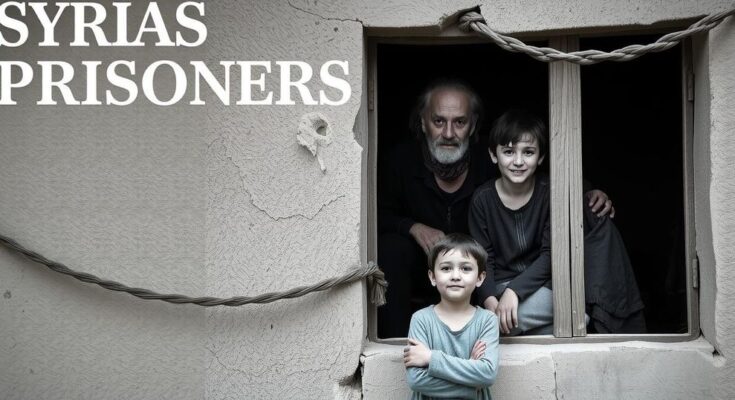Following the fall of President Bashar al-Assad’s regime, many Syrians are searching for loved ones imprisoned or disappeared during the conflict. While some prisoners, like Mazen al-Hamada, have shared harrowing accounts of torture and advocacy, others like Rania al-Abbasi and her family remain missing. The stories reflect a broader struggle for justice amidst the ongoing trauma in Syria’s sociopolitical landscape.
In the aftermath of President Bashar al-Assad’s regime, Syrians have been searching their notorious detention facilities seeking loved ones who have been incarcerated or have disappeared. Thousands have been freed, yet many remain unaccounted for, with a grim fate estimated for many inside government-run prisons. The Syrian Observatory for Human Rights reports that nearly half a million died in the civil war, with up to 100,000 presumed to have died in these jails.
The story of Mazen al-Hamada resonates widely, after he was detained for participating in demonstrations against the regime. He endured severe torture for nearly two years, detailing horrific experiences before eventually being released and fleeing to Europe. Although he became an influential speaker advocating for justice, he returned to Syria in 2020 on misleading terms, only to be imprisoned again. His body was later found, symbolizing ongoing suffering and brutality under Assad’s regime.
Rania al-Abbasi, a prominent dentist and chess champion, along with her husband and their six children, was also apprehended by the regime after a charitable act towards a besieged family. Years of searching have yielded no answers for her sister Naila, who desperately looks for her missing family while grappling with the hope of justice.
Tal al-Mallouhi, a young poet, was arrested for her writings critical of the regime. After nearly 15 years in prison, she was finally reunited with her mother, but her experience remains a painful mystery, with her family still unaware of the suffering she endured.
These narratives shed light on the collective trauma faced by countless families in Syria, embodying the despair and perseverance in a quest for justice against a tyrannical regime.
The Syrian conflict, initiated in early 2011, has led to significant human rights violations, particularly in government-operated prisons. The Assad regime has been notorious for its ruthless suppression of dissent, resulting in widespread arbitrary detentions and torture. Many families continue to search for missing loved ones, with varying stories of resilience among survivors contrasting the ongoing struggle for justice and accountability. As the regime’s grip on power wanes, these personal stories highlight the traumatic legacy of the civil war and the fight for recognition and reparation.
The stories of Mazen al-Hamada, Rania al-Abbasi, and Tal al-Mallouhi exemplify the suffering, courage, and relentless pursuit of justice for victims of the Syrian regime. As families continue to navigate the pain of loss and uncertainty, their narratives remind the world of the ongoing need for accountability and the pursuit of truth in the face of systemic horror.
Original Source: edition.cnn.com




